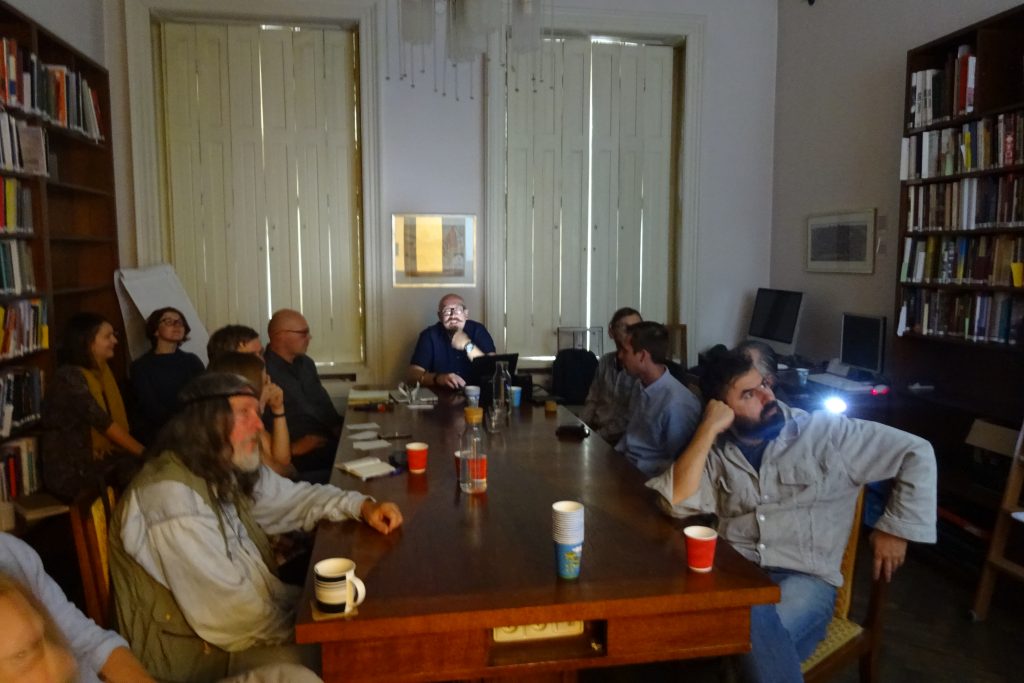Soviet Youth, Rituals of Resistance and Normalization
Volodymyr Okarynskyi, Bohdan Shumylovych, Aimar Ventsel
September 24, 2019 / 4.00 pm
Center for Urban History, Lviv
Despite the fact that Soviet authorities have always treated Western popular culture with suspicion and often with hostility, Communists would gladly include the elements of this culture to develop their own Socialist pop-style. It can be illustrated by the art of Karel Gott, Maryla Rodowicz, or such bands as "Vesiolyie Rebiata" or "Smerichka". Key requirement was to create not the mass culture but the culture for the masses. In order to distract young people from the "hostile" and "capitalist" music, different methods were used, such as threats and sanctions, or over-persuasion and production of own "imitations". Authorities tried to create the alternative past with no place for show business but filled with sincerity, happiness, and kindness. However, despite the willingness of social elites, Western music was confidently capturing the hearts of Soviet youth.
There will be three presentations at the seminar:
- Volodymyr Okarynskyi (Volodymyr Hnatiuk Ternopil National Pedagogical University) "Dissemination of Soviet Music Among Young People in the West of Soviet Ukraine (1960s-1980s)"
- Bohdan Shumylovych (Center for Urban History) "In a Bid for Hearts: the Study of Tastes of Ukrainian Young People in the Early 1980s"
- Aimar Ventsel (Universtiy of Tartu) "Soviet Estonian Punk: Resistance, Pastiche and Nationalism"
Working languages - English and Ukrainian
Volodymyr Okarynskyi
Candidate of History, Volodymyr Hnatiuk Ternopil National Pedagogical University (Ukraine). Historian, anthropologist, Candidate of History (2001), associate professor at the Department of the History of Ukraine, archeology, and special fields of history in Volodymyr Hnatiuk Ternopil National Pedagogical University. Key research focus includes countercultural studies, non-conformism, alternative lifestyles in Ukraine in the Modern age. Specific publications were dedicated to local history (Ternopil), youth movements, the fate of civilians and minors in military conflicts. Author of several monographs and co-author of several collective monographs. His recent book is “Ternopil: City, People, History (from Ancient Times to 1991)” (2017). member of the International Humanitarian Studies Association.
Bohdan Shumylovych
Coordinator of the “Urban Media Archive”at the Center for Urban History, he lectures and engages in the design of theme-based exhibitions at the Center for Urban History, a researcher. Key focus of his work is media history and history of television in East Central Europe and the Soviet Union, as well as interaction of digital history and conventional historiography. He is interested in media art, visual studies, urban planning practices and urban creativity (creative city and creativity in the city).
Aimar Ventsel
PhD, Senior Research Fellow in Ethnology, Department of Ethnology, Universtiy of Tartu. He has worked at the Estonian Literary Museum, Estonian Academy of Sciences and Estonian National Museum. He has a PhD in social anthropology from Martin Luther University Halle-Wittenberg. Since 1995 he has conducted regular ethnographic studies in West-Siberia, Yakutia and Eastern Germany. His main subjects of research are economic and judicial anthropology, musical cultures, identity processes and ownership in the music industry. He is a member of the International Association for the Study of Popular Music and participates in the work of the Centre of Excellence in Cultural Theory in collaboration with the University of Tartu. He is the author of the book My Yakutia.
